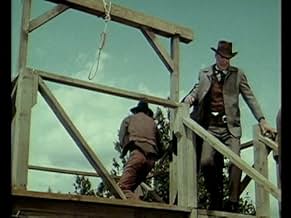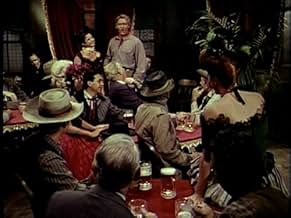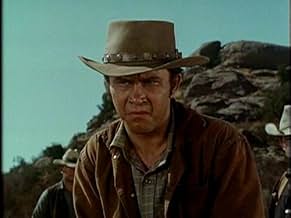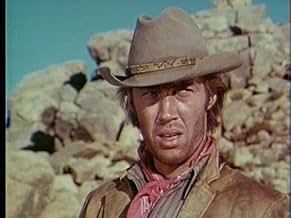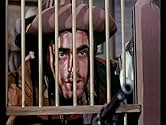अपनी भाषा में प्लॉट जोड़ेंThe western adventures of tough, but fair, Marshal Jim Crown.The western adventures of tough, but fair, Marshal Jim Crown.The western adventures of tough, but fair, Marshal Jim Crown.
एपिसोड ब्राउज़ करें
फ़ीचर्ड समीक्षाएं
This was a great series featuring the tough but tender Jim Crown. Plenty of action and gunplay kept the stories interesting each week. One year a friend and I kept count of the men Crown killed as compared to Matt Dillon. I don't remember which marshall came out on top, but the difference was only 2 bodies. I didn't miss an episode of this one, not only because Jim Crown was so cool, but I also liked looking at "Biscuit". Of course, MacGregor was always good for a laugh or two. Great show.
I've caught the show once or twice on TBS (I think)--early Saturday mornings. Thing is--it's been edited down to a 60 minute show--so as to more easily sell it for syndication. There goes much of the dramatic complexity of it. Also--it isn't called 'Cimarron Strip'. It's 'Marshall Crown'--I believe. I even tried @ a video store near me--Audio Video Plus--& I found some of them. I think Stuart Whitman, himself, might own the rights these days.
I LOVED this series. Others were 2-dimensional, by comparison. Jim Crown was a former gunslinger, who had reformed. Sometimes, friends from the bad old days would show up--thinking they'd be cut slack. Wrong. Well--Crown WOULD try to dissuade them from illegal activities--to no avail. He'd end up having to kill his old friend--w/much remorse.
I remember reading that, when CBS cancelled the show, they issued a memo, explaining that the characters should be either good or bad--no shades of grey. In other words, the show was too sophisticated for it's time.
I LOVED this series. Others were 2-dimensional, by comparison. Jim Crown was a former gunslinger, who had reformed. Sometimes, friends from the bad old days would show up--thinking they'd be cut slack. Wrong. Well--Crown WOULD try to dissuade them from illegal activities--to no avail. He'd end up having to kill his old friend--w/much remorse.
I remember reading that, when CBS cancelled the show, they issued a memo, explaining that the characters should be either good or bad--no shades of grey. In other words, the show was too sophisticated for it's time.
The 23 (90 minute) episodes of the CBS television western "Cimarron Strip" were originally broadcast during the 1967-68 television season, running from 7:30PM to 9PM on Thursday nights. In 1967 a 90-minute time slot seemed reasonable as "The Virginian" (1962-1971) had enjoyed considerable success with this expanded running length; 248 episodes in total. And before that "Wagon Train" made a portion of its episodes this long. Unfortunately for "Cimarron Strip", by 1967 the television western was on its way out and viewers never really warmed up to the show.
Unlike "The Virginian" and "Wagon Train", "Cimarron Strip" is not structured in the anthology style, a format better suited to the longer format because it emphasizes guest stars and a large cast of intermittently appearing characters. If anything "Cimarron Strip" went to the other extreme, focusing on only two regular characters and a single theme; the other regular cast members rarely appear in anything more than supporting roles.
While this narrow focus is a poor match to the longer running length, it is also what makes the series so special. If not television's all-time best western, "Cimarron Strip" is certainly the most ambitious. The episodes are set in the 1880's and revolve around the interplay between Marshall Jim Crown (Stuart Whitman) and Dulcey Coopersmith (Jill Townsend). Crown is a somewhat world-weary lawman tasked with maintaining law and order in the vast Cimarron Strip (named after the Cimarron River and comprising parts of Oklahoma, Kansas, Colorado, and New Mexico). Dulcey is a compassionate and caring young woman from the East who has inherited (from her father) the local inn; a combination saloon, boarding house, and jail.
Dulcey's innocence and goodness inspire the otherwise disillusioned Marshall, who in turn protects her from what he can and tries to put the rest in perspective for her. Dulcey is obviously symbolic of the arrival of civilizing forces to the frontier but in a larger sense she represents the loss of innocence process anywhere and anytime. The series is in many ways her coming of age story. It doesn't hurt that Townsend is hauntingly beautiful, with a refreshing natural look and a hair-style that swept the country during and after the premiere of the series.
Moral ambiguity is the other regular theme, with guest stars often redeeming themselves with a final act of personal responsibility. Typically these characters are portrayed as individuals who have had to subordinate their basic goodness in order to survive in this tough environment.
Almost every episode included several top quality and well-known guest stars, whose performances were always up to the task.
Then again, what do I know? I'm only a child.
Unlike "The Virginian" and "Wagon Train", "Cimarron Strip" is not structured in the anthology style, a format better suited to the longer format because it emphasizes guest stars and a large cast of intermittently appearing characters. If anything "Cimarron Strip" went to the other extreme, focusing on only two regular characters and a single theme; the other regular cast members rarely appear in anything more than supporting roles.
While this narrow focus is a poor match to the longer running length, it is also what makes the series so special. If not television's all-time best western, "Cimarron Strip" is certainly the most ambitious. The episodes are set in the 1880's and revolve around the interplay between Marshall Jim Crown (Stuart Whitman) and Dulcey Coopersmith (Jill Townsend). Crown is a somewhat world-weary lawman tasked with maintaining law and order in the vast Cimarron Strip (named after the Cimarron River and comprising parts of Oklahoma, Kansas, Colorado, and New Mexico). Dulcey is a compassionate and caring young woman from the East who has inherited (from her father) the local inn; a combination saloon, boarding house, and jail.
Dulcey's innocence and goodness inspire the otherwise disillusioned Marshall, who in turn protects her from what he can and tries to put the rest in perspective for her. Dulcey is obviously symbolic of the arrival of civilizing forces to the frontier but in a larger sense she represents the loss of innocence process anywhere and anytime. The series is in many ways her coming of age story. It doesn't hurt that Townsend is hauntingly beautiful, with a refreshing natural look and a hair-style that swept the country during and after the premiere of the series.
Moral ambiguity is the other regular theme, with guest stars often redeeming themselves with a final act of personal responsibility. Typically these characters are portrayed as individuals who have had to subordinate their basic goodness in order to survive in this tough environment.
Almost every episode included several top quality and well-known guest stars, whose performances were always up to the task.
Then again, what do I know? I'm only a child.
10bfm_1017
I recently discovered this show in reruns on Encore Westerns. I honestly never saw this show in its first run, and don't know how I missed it. Some of the best stories I've seen in Westerns, well directed, Stuart Whitman is very believable as Marshal Crown, tough and honest to a fault. I don't know how shows like this didn't last, yet Gunsmoke was on forever it seems. The Encore copies are around 1 hr 17 minutes each, so they appear uncut, and without commercials. The 1 1/2 hr format allows the story to be well developed and to have multiple twists. I am quite genuine in saying shows like this are non existent anymore. The prints are not great, especially when compared to Big Valley or Bonanza which appear to have been restored. Now I wish someone would run "Lancer", "High Chaparral", "Branded", "Have Gun Will Travel" among other old westerns.
Cimarron Strip is top drawer among westerns right up with my personal favorite - "The High Chaparral".
Cimarron Strip is top drawer among westerns right up with my personal favorite - "The High Chaparral".
I still remember the almost mystical episode where a mysterious something was killing folk just outside the perimeter of the town, leaving their bodies so mutilated that no-one could identify whether death was caused by man or beast. Cimarron Strip was like a western version of the Twilight Zone, instead of being the cartoon town which every other show had the Strip was its own place, far removed physically from the rest of the west and far removed in philosophy and execution from the rest of western TV shows. You never knew what complex psychological problem would come riding into town each week. Marshall Jim Crown stalked the Strip like a six-gunned God and town maiden Dulcie was the fairest of the fair. In TV Heaven, they show this every day. They should - there's never been another western like it.
BB
BB
क्या आपको पता है
- ट्रिवियाThis show was originally broadcast on Thursday night from 7:30- 9:00 p.m. Eastern Time during the 1967-68 season. It lasted only one season due to its competition. On ABC, it went up against "Batman" (1966), "The Flying Nun" (1967) and "Bewitched" (1964) and on NBC "Daniel Boone" (1964) and "Ironside" (1967). In the 1960s and 1970s it was a common practice for the networks to rerun old programs during the summer rerun season, even if the show had been off the air for several years. Such was the case with this show, which was shown by CBS during the summer of 1971, three years after it had been canceled.
- गूफ़The real Cimarron Strip is the panhandle of Oklahoma. It is very flat plains and not the mountainous or desert terrain shown in the series.
- कनेक्शनReferenced in The Beverly Hillbillies: Cimarron Drip (1967)
टॉप पसंद
रेटिंग देने के लिए साइन-इन करें और वैयक्तिकृत सुझावों के लिए वॉचलिस्ट करें
- How many seasons does Cimarron Strip have?Alexa द्वारा संचालित
विवरण
इस पेज में योगदान दें
किसी बदलाव का सुझाव दें या अनुपलब्ध कॉन्टेंट जोड़ें



